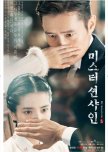
I will immediately note that this drama was perfectly cast. Every actor is a natural fit for their role and each character is very memorable. Among the main characters, Lee Byung-hun as Eugene Choi and Byun Yo-han as Kim Hee-sung stand out in my mind. Even the side characters feature great acting with Choi Moo-sung as Jang Seung-goo and Lee Seung-joon as Emporer Gojong.
The characters of Mr. Sunshine are intriguing enough to pull the show through its slowest parts. The mains come from a wide variety of backgrounds offering unique perspectives on the rapidly changing society of the setting. It is particularly interesting in that the show offers the perspectives of those born in the lower classes of Joseon society with Eugene Choi, who was born a slave, and Goo Dong-mae, who was born into a butcher family, considered to be the lowest tier in Joseon's caste system. The show also gives a voice to women of the late Joseon era. Protagonist Go Ae-shin is a noblewoman longing to gain more education and get involved in the politics of her nation against the wishes of her tradition-minded father. Kudo Hina is a successful businesswoman, a rarity in Joseon at the time of this setting, who operates a hotel hosting primarily foreigners. Unlike other characters, her loyalties are not immediately apparent and she acts as an interesting bridge between the other main characters. Lastly, Kim Hee-sung is the second-richest nobleman in Joseon but lacks ambition and purpose, causing him to waste his time with womanizing and drinking. Surprisingly, it was Kim Hee-sung who ended up being my favorite due to his fantastic development.
Great attention is paid to the details of Mr. Sunshine's story. For example, the first episode is essentially a long prologue but the viewer does not realize that literally every line uttered in the first episode is built upon throughout the story and nearly every character with a speaking role becomes an important character later in the story. The show is not afraid to demonstrate this with plethora of flashbacks, which admittedly can be excessive at times.
Romance is a main feature of the story. There are even two love triangles involving to some extent all of the five main characters. Fortunately, the drama never becomes "guess who this character will chose!" It is evident from the beginning who each character loves and also that their feelings will not be fickle.. The drama from these love triangles come from unrequited love and love that breaks Joseon societal norms. I was skeptical of the romantic element for the first half of the story but all doubts were put to the rest when I saw how the romance builds on itself in the second half.
Emotions are powerful in this show. The emotions in scenes are amplified by a striking soundtrack that never seems to run out of heart-wrenching melancholic songs. Viewers should certainly be aware that they are not in for a picnic of a drama. However, the drama is not always go cruel and dark, especially in the beginning. For every scene showcasing Japanese cruelty to Koreans there is a romantic scene or comic relief. The writers are smart enough to pace these scenes of wildly different emotions from each other. Viewers won't go from viewing two servants cracking jokes immediately to an execution.
Perhaps the greatest point to make about Mr. Sunshine is that it is an evocative show. At times it can feel like propaganda with its uncompromisingly negative portrayal of the Japanese yet slightly positive portrayal of the United States. However, the show is not afraid to be critical of Joseon society. Three of the main characters have tragic backstories literally caused or exacerbated by the backwardness of the ultra conservative culture. The other two characters rebel against their society's culture and norms, albeit in very different ways.
Aside from the show's politics, I have a desire to write about this drama's character development, romance, the emotionally powerful soundtrack, the impressive cinematography, the metaphors and symbolism. I may write a analysis of these topics in another spoiler-heavy review.
Do not expect to get the best war story ever told or the best romance ever written with Mr. Sunshine. Mr. Sunshine is a jack of many genres, but a master of none. This will be absolutely fine if you enjoy historical romantic dramas with a story about war and rebellion. Like me, you will be easily able to get through the slow pacing approximately episodes 3-13. If you are not a fan of these genres it will be more difficult, but I still recommend to give Mr. Sunshine a shot.
Esta resenha foi útil para você?


